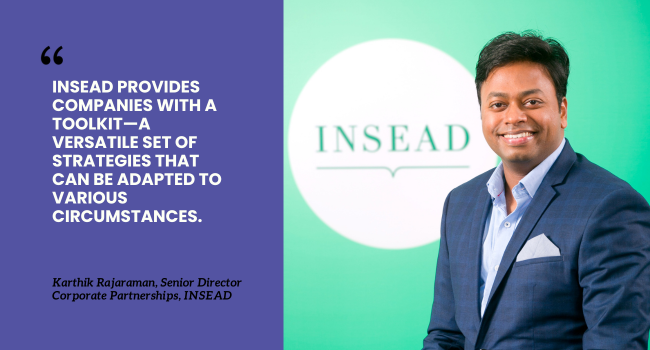INSEAD leaders on navigating the evolving landscape of executive education in APAC

The need for executive education is growing in Asia Pacific regions, especially in India. People Matters met up with Sameer Hasija, Dean of Executive Education, and Karthik Rajaraman, Senior Director Corporate Partnerships, INSEAD, during INSEAD’s Global Alumni Forum in India and asked them about the evolving landscape of executive education.
In this joint conversation, their insights shed light on the pivotal role of executive education in fostering global mindsets, navigating tech advancements, collaborating with industries, and the vital synergy between HR partners and leadership development.
Executive education in India
In today’s evolving world of work having a vanilla degree may not be enough to help you strive in the workplace. It has increasingly become crucial to keep yourself updated to stay ahead of the curve.
Sameer who began his association with INSEAD as a junior faculty in 2008, believes that India is in an advantageous position to become a massive global player. Hence, the country needs to focus on capability building rigorously and having a global mindset.
“Firstly, there's a pressing need for Indian businesses to adopt a more global and international mindset. It's crucial to understand what it truly means to engage in business on a global scale, moving beyond being merely a manufacturing hub to becoming genuine business partners on the world stage. Executive education plays a pivotal role here by helping organisations unlearn outdated practices and relearn strategies aligned with global collaboration and value addition,” says Sameer. According to him, it is the right time to take a mindful decision to continue with the accelerated pace of development.
“Secondly, amidst increasing ambiguity and uncertainty globally, Indian companies must equip themselves with the right tools to navigate through this complexity. Rather than providing a fixed roadmap, executive education provides—a foundational understanding of direction and principles that remain constant even as circumstances evolve. This approach ensures that businesses develop fundamental capabilities for long-term success, guided by intellectual sparring rather than short-term consultancy,” adds Sameer.
In today’s highly interconnected business world, executives are expected to have in-depth perspectives on functional areas, strategic thinking, and business leadership skills and executive education gives that needed exposure to them.
“To reap the benefits of being in an advantageous position, India needs to enhance its capability-building initiatives,” says Sameer, encouraging executives to seek out courses that can meet their needs.
Highlighting how INSEAD operates and delivers interventions, Karthik says that there is a fundamentally different way compared to traditional prescriptive methods. “Instead of giving specific instructions or a one-size-fits-all approach, we provide companies with a toolkit—a versatile set of strategies that can be adapted to various circumstances. This empowers organisations to understand how to leverage the toolkit effectively in response to market demands and economic changes.”

Karthik mentions that it’s also important for education providers to prioritise a deep understanding of each organisation's unique requirements. “This means that we are transparent about our capabilities and are willing to recommend other partners if we believe they can better serve a particular need. Our approach has resonated with companies seeking to expand internationally or gain a global perspective, driving significant growth for us in India over the past few years.”
Takeaways:
- Knowledge and understanding of technology is a necessity
- Organisations must have a global and international mindset
- India is at an advantageous position to be a value-added player
The criticality of technology
It is impossible to imagine a business without technology. Knowing technology if not the expertise has become a necessity. Highlighting the critical importance of having a deep understanding of technology across industries, Sameer says that it's no longer a luxury but a necessity, especially for non-tech professionals who may not have a fundamental interest or training in tech. “The key is not to become a tech expert but to understand how to interact effectively with tech teams, ask meaningful questions, and leverage technology for value creation and differentiation.”
Sameer explains that companies should seek out tailored approaches to their own specific needs, audience, context, and future aspirations, rather than a one-size-fits-all menu of programs. Instead, he says, what works best is a “customised journey that guides organisations towards developing essential competencies at the intersection of tech and business.”
Pointing to INSEAD’s own lineup of instructors, he says, “We bring together faculty with diverse backgrounds, including engineering, economics, and industrial engineering, to provide a comprehensive range of capabilities and expertise. This collaborative effort ensures that executives gain the necessary skills to have coherent conversations and make informed decisions regarding technology's role in their business models.”
Organisations that focus on the importance of leveraging technology have seen profound advances in organisational transformation. Sameer cites TCS, which collaborated with INSEAD for upskilling efforts. “TCS, with its strong tech background, recognised the need to not only excel in technical expertise but also to become trusted advisors to their clients. This led to a comprehensive learning journey involving thousands of employees, combining faculty-led sessions with practitioner-led interventions. The multi-module, multi-channel approach ensured that learning was integrated into their work context, resulting in a fundamental shift in their value proposition and market positioning,” highlights Sameer.
Executive education is a means to help organisations grow and achieve their goals
Sameer highlights the importance of executive education permeating through all levels of the organisation to foster a culture of shared vision and collective action. This approach, he believes, is essential for leaders to be truly effective in driving organisational success.
“The COVID-19 pandemic served as an eye-opener of the significance of investing in human capital and continuous learning. Organisations that prioritised human capital development and viewed HR as a strategic partner to the CEO thrived during challenging times and are now accelerating beyond average performance post-pandemic.” Sameer also notes that there is a shift in HR conversations from focusing solely on career paths to emphasising skills development and building fundamental capabilities across all levels of the organisation.
Sameer underscores that organisations that invest in executive education at all levels, experience accelerated growth and success, while those who overlook this critical aspect may face challenges in navigating complex and evolving business landscapes.
In this context, the HR partner has a pivotal role to play as a strategic business partner rather than just a service provider for payroll or administrative tasks. “We engage in continuous debates and discussions to ensure that we are always thinking about developing the necessary capabilities and skills within our organisation,” adds Sameer.
“Collaborating closely with individuals like Karthik, we prioritise skill development and constantly refine our approach to talent management. This practice reflects our commitment to walking the talk and staying relevant in a dynamic and competitive landscape. After all, neglecting the development of skills and capabilities internally would render us redundant in the blink of an eye,” explains Sameer.
Leaders need to walk the talk
Leadership is a collective responsibility, but leaders also serve as role models for the entire organisation. It's essential to walk the talk and stay ahead of the curve, especially in today's fast-paced tech-driven world. For Sameer, effective leaders are those who are trusted by their teams, and this trust is built on a deep understanding of value creation and continuous upskilling.
“In today's context, leaders face the challenge of catching up with the accelerated evolution of technology. However, what's encouraging is that many leaders are willing to embrace this challenge and invest in their learning and development. Those who are hesitant to do so, must ask themselves whether they have what it takes to lead their organisation into the future,” says Sameer, adding that they must invest in training, and continually refine their skills to stay relevant and avoid obsolescence.










